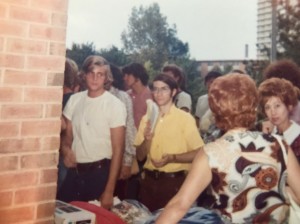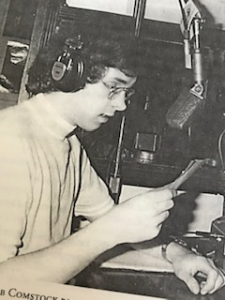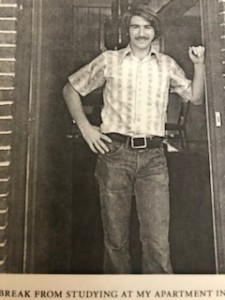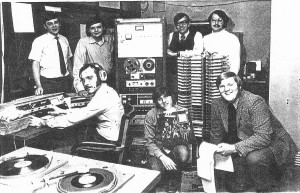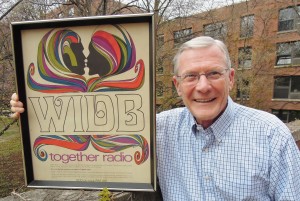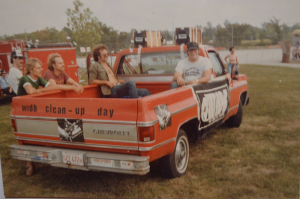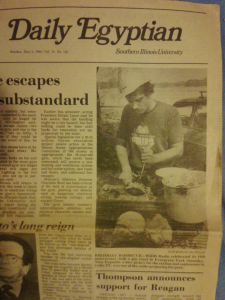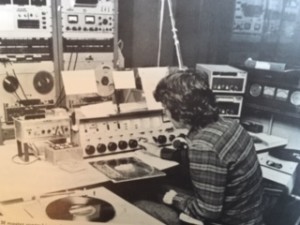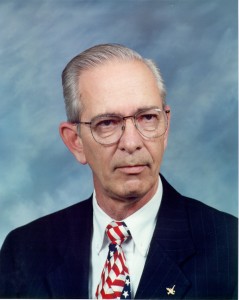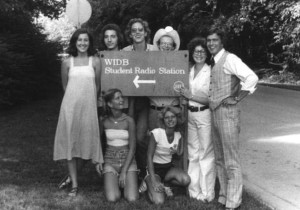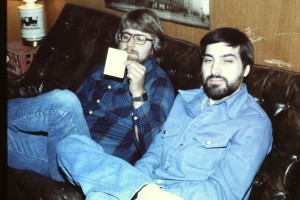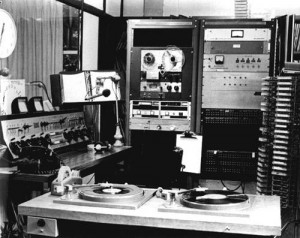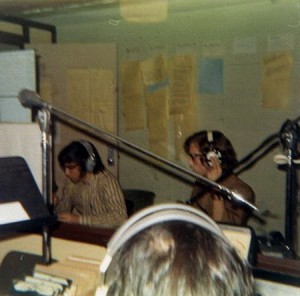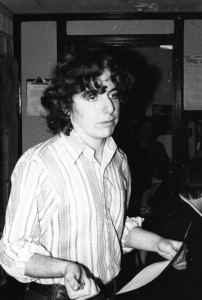By Stew Cohen
In the summer of 1972, more than 1,600 male students moved into
Schneider Hall on the SIU Campus. I’m in the yellow shirt waiting in a slow line to check in. As you could guess, I’m a freshman surrounded by freshmen and truthfully most of us hoped we were not assigned to a room on the 16th floor because we heard those fire alarms where you have to walk down 16 flights of stairs can kill you.
A resident assistant (RA) told me I was assigned to a room on the 7th
floor. I checked in to the 7th floor and walked into my room with my Mom and Dad and we set up my half of the room. This was the floor where the key people for my future were just down the hallway. Don Strom future news director and Bob Comstock, his future assistant at WIDB were roommates on the 7th floor. I became friends with Bob because he was the type of person that you could not help but like and had this great voice and was funny in the way he reacted to things I said.
Despite all the activities on and off campus, I was bored on weekends.
Bob and Don would head to the radio station in the basement of Wright 1.
I asked Bob if I could tag along. He said he couldn’t spend a lot of time talking to me because he had to prepare and anchor newscasts for a few hours but I could come along. I had never visited the inside of a radio station before.
Bob prepared in both the newsroom and on-air news booth. I looked around where I sat just outside the newsroom. While the newsroom had a rectangular table, chairs, and a typewriter, the main room where I sat had a water fountain, clock, wire service machine, and speaker. I watched Bob rip wire copy from a very loud, clacking United Press International (UPI) machine. He retyped news stories and moved to the on-air booth where he adjusted the microphone and headphones, cleared his voice, and closed the door in his studio. The room was about the size of a walk-in closet. Bob pressed a button that switched on the on-air light in the room. He waited for the jock’s cue. Thick glass panes separated the studios, so however forcefully Bob cleared his throat, the sound wouldn’t go on-air in the jock’s studio if the microphone was accidentally left on. Bob looked calm; he didn’t move around in his chair or reposition the microphone or do anything that might suggest nerves. This was the first time I’d see anyone perform on radio and the whole experience hooked me.
The announcer’s index finger chopped down through the air. Instantly,
Bob lowered his neck, hunched forward, and straightened his shoulders. He
began reading. His voice came out richer than I heard him talking a few
minutes earlier. He made it all look so easy.
I sold myself on the idea that I wanted to do this. I asked if I could sit in the WIDB news booth. He let me go in. I pretended to do the news. He had left his news copy on
President Nixon and Secretary of State Henry Kissinger talking about Vietnam. The other stories were scattered about on the floor where he dropped them as he went through page by page of his newscast. I almost
forgot that I had zero experience on-air. Could I do this? I had a little trouble with nervousness in front of people. But I needed an answer and this was better than being bored! Yet, several months passed. I played a game in my head of thinking I wanted to….then I didn’t want to…then I wanted to read and do an audition.
I found out about news auditions. Bob had wondered when I’d get around to it. He put me on a list as he and Don had just started the audition process in my sophomore year, still living in the dorm on the 7th floor near Bob and Don.
The day came. I looked forward to the audition one moment and dreaded
it the next. At the radio station, several news hopefuls waited in the
lobby. Some sat on chairs. A few sat up on a table. I was clearing my
throat every few seconds. Don came by, smiling and looking calm. His calm didn’t help me. One by one, each of the people there left the main room for an audition. I waited about an hour. Just then, Don and Bob walked over. They directed my attention to a cubicle, where they set up a Wollensak 3M reel-to-reel tape recorder and microphone. Don told me to
press the record button and play button together and then start reading my news when I was ready.
I checked the copy about a dozen times, putting every piece of paper
in order of importance and then I turned on the recorder, but then I turned it off. Was anyone looking and listening? I stood on the table to look over the wall of the cubicle and no one was there to listen. I sat down again and grabbed the copy and turned on record. I timed out five minutes and made it to the weather and sign off. I was done and I listened back, heard nothing, tried to rewind again and listen and still nothing, so I got Don and he again showed me how to work the reel-to-reel. This time I believed I had something but I wasn’t going to listen back in case I accidentally screwed up the recording. But really, screwing it up might have been an improvement. I think the words “stinking raw” probably described my audition.
I knew Don could not accept this, my first audition and he
didn’t…the second and third auditions were equally as bad and the fourth was only marginally better than the others. By the start of the fifth audition, I had lost my voice and so I didn’t have a chance to embarrass myself so I waited for the sixth which came early in my junior year.
I walked around the campus talking to myself and sometimes I talked
fairly loud because I was trying to find a formula for sounding
conversational. I talked to Professor Shipley in the radio department and
asked him what I could do to sound conversational as though something other than practice, practice, practice might do the trick. Shipley pretty much told me to practice reading aloud as often as I read books for class.
The sixth audition moved along much better than the others. I didn’t
want to give him the reel of tape though he put out his hand. Don said he would let me know within a couple of days. He called that evening and my roommate told me he was on the phone…so I picked up the phone in my room at Lewis Park.
“I’ve got good news for you,” Strom said. “Are you doing anything
Friday and Saturday nights?” I was ready. I had practiced what I’d say.
I had to say this just right to give him the impression I was confident.
He asked and I said, “Yes.” Your shift is 10pm to midnight Friday and
Saturday. By the start of the following week, my euphoria from Don’s
announcement slid into apprehension. I was never on-air, unlike many of
people I’d met at WIDB. They were very experienced from years of training on their high school speech team in radio speaking and some of them were state champions.
Being a creature of many nervous habits, I did everything the same
way. I didn’t want to jinx myself in the days before I would slide into the news studio and do actual newscasts. There must have been a reason why Tony Waitekus stood in front of the jock studio. Maybe he’d been working in a separate production studio. I was grateful the WIDB news anchor was available if I lost the tug of war going on in my head.
I can’t ask him to read my news. I’ll go through with this. Maybe I
should ask him, but that’s it. I’ll be done with this. Logic wasn’t winning the imaginary tug-of-war. I have to do this! Maybe I could ask him for a bottle of Jack Daniels?
But then it dawned on me that Tony would not have a bottle. Tony’s voice was my lifeline. I asked him if this gets any easier.”Stewart, you’ll be just fine,” Tony calmly asserted.
I pressed, “How do you do it?”
“Read news?”
“No,” I said, “how can you stay calm before you go on?”
“I am nervous, you just won’t know it.”
Tony assured me that I’d live through this and then I’d do many more
newscasts.
After Tony left the room, I repeated, “Who’s nervous? I can do it.
I closed my eyes, but the light of the newsroom on the inside of my
eyelids didn’t give me the darkness of calm.
On went the headphones, on went the on-air light, and on went the
newsroom microphone. Tom Sheldon cued me from the adjacent studio. I
opened my mouth and my heart pounded faster.
“I’m Stewart Cohen of WIDB News…and in the news today…President
Nixon…”
Slightly unsteady, hesitating between sentences, my voice gave the
impression of a boat motor refusing to fully turn over. Declarative
sentences sputtered; the boat took on water. I was literally sinking.
Reality was that it became increasing more difficult to speak. I started to
hyperventilate as I was sucking in air and trying to speak…and in the
final few minutes I grew extremely dizzy. The little news studio started
to spin. I somehow got to the end. Five minutes passed.
“In Carbondale, it’s 55, I’m Stewart Cohen WIDB News.” I could say no more. My legs were wobbly. The room wouldn’t stop spinning. I had no more oxygen in my lungs.
“Good job!” Sheldon yelled through the glass.
Some lies are helpful. His…made me feel a bit better about myself.
Stew Cohen

